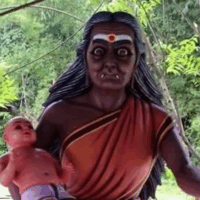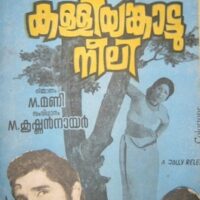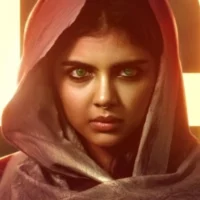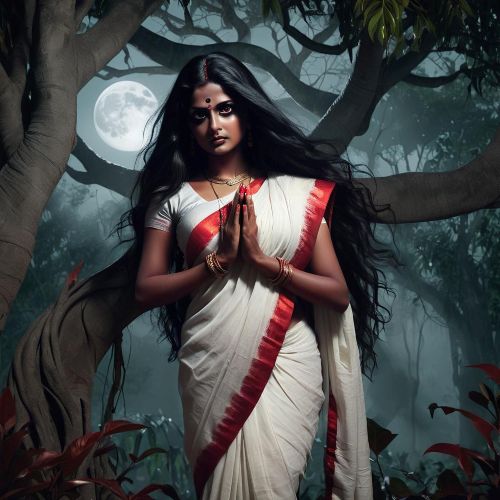Kalliyankattu Neeli : The Bloodthirsty Ghost of Kerala
Listen
At a glance
| Description | |
|---|---|
| Origin | Indian Mythology |
| Classification | Ghosts |
| Family Members | Neelan (Brother) |
| Region | India |
| Associated With | Blood thirst, Beauty, Vengeance |
Kalliyankattu Neeli
Introduction
Kalliyankattu Neeli is one of the most enduring and haunting figures in South Indian folklore, especially within the cultural memory of Kerala and Tamil Nadu. She belongs to the tradition of Yakshis—spirits who combine beauty, seduction, and terror—but her story is far more layered than that of a typical ghost. Legends about Neeli have been preserved in villadichan pattu (ballads sung by wandering minstrels), folktales from Travancore, and literary works like C.V. Raman Pillai’s novel Marthandavarma. Her tale begins with betrayal and murder but transforms into one of vengeance, reincarnation, and finally divinity. While she is remembered as a bloodthirsty Yakshi in oral stories, Neeli is also worshipped as a mother goddess at a temple in Panchavankadu, showing how her image has shifted from terror to reverence over centuries.
Physical Traits
Descriptions of Neeli consistently emphasize her extraordinary beauty paired with a sense of menace. Before becoming a spirit, she was born as Alli, the daughter of Karveni Amma, a Devadasi. Alli was renowned for her striking eyes and long, dark hair that reached down to her knees. Her beauty, however, was not passive—it carried an unsettling intensity that made her stand out in local memory. After her transformation into a Yakshi, her allure became a weapon. In stories, Neeli uses her physical charm to lure men, but beneath the surface lies her ghostly nature, capable of unleashing violence. This duality of enchanting appearance and deadly intent has made her a central figure in the archetype of the Yakshi, embodying both fascination and fear.
Family
Neeli’s legend begins with tragedy in her human life. Alli married Nambi, a temple priest who was drawn to her wealth rather than love. His betrayal led to Alli’s brutal death, when he murdered her while she was pregnant, leaving her lifeless body beside a rock. Her younger brother Ambi, devastated at the sight, ended his own life in grief. Fate seemed to exact its own revenge when Nambi later died of a snakebite.
The siblings were reborn as Neelan and Neeli, children of a Chola king. Unlike ordinary children, they brought misfortune wherever they went, preying on cattle and spreading terror. Their father, unable to destroy them himself, abandoned them near Panchavankadu, a forested region near Nagercoil. There, their story took a supernatural turn. Local sorcerers managed to slay Neelan, but Neeli’s wrath remained unstoppable. She avenged her brother’s death and targeted those connected to her past, including the reincarnation of her former husband. The cycle of betrayal and vengeance carried through her different lives, making her legend one of eternal retribution.
Other names
Kalliyankattu Neeli is known by several names depending on the tradition and region. She is often called Panchavankattu Neeli, linking her to the forest where she established her dominion. In Pazhayannur, she is remembered for deceiving villagers and slaying her reincarnated husband, giving rise to the name Neeli of Pazhayannur. Folklore also calls her simply Yakshi Neeli, a title that places her among the broader pantheon of female spirits in Kerala mythology.
Her identity has even crossed into popular culture. In modern cinema, Neeli has been reimagined as a supernatural character with different facets, from terrifying spirit to misunderstood vigilante. This flexibility in her naming and portrayal shows how her legend continues to adapt to new contexts while staying rooted in tradition.
Powers and Abilities
As a Yakshi, Kalliyankattu Neeli possesses an array of supernatural powers that reflect her dual nature as both destroyer and protector. She is often described as a shape-shifter, able to disguise herself as a grieving woman carrying a child to manipulate unsuspecting villagers. Her ability to weave illusions allowed her to deceive entire communities, turning them against her victims. Alongside this gift of deception, she was feared for her bloodlust, as she and her brother Neelan were said to drink the blood of livestock during their nocturnal hunts.
At the same time, legends suggest that Neeli’s powers extended beyond vengeance. Over time, she evolved into a figure of divine wrath, worshipped as a goddess who could protect devotees from harm. In certain interpretations, she was subdued by Kadamattathu Kathanar, a priest known for his magical powers, and persuaded to redirect her strength toward safeguarding people rather than destroying them. This transformation captures the paradox of her myth—what begins as ghostly terror becomes divine power, bridging the worlds of fear and faith.
Modern Day Influence
Kalliyankattu Neeli continues to cast a long shadow over Kerala’s cultural imagination. She has inspired films, songs, literature, and even temples, proving that her legend has not faded despite its ancient roots. For decades, Neeli has been a recurring figure in Malayalam cinema and television. The 1979 film Kalliyankattu Neeli introduced her as a terrifying presence on screen, while the 1985 classic Kadamattathachan retold her story within the folklore of Kadamattathu Kathanar. Television adaptations also kept her alive as a spectral character, reinforcing her role in Kerala’s supernatural traditions and ensuring that new generations were introduced to her legend.
In recent years, her story has been reimagined for modern audiences. The 2025 superhero film Lokah Chapter One: Chandra saw Kalyani Priyadarshan play Neeli under the alias Chandra, shifting her portrayal from a feared Yakshi into a heroine with strength, resilience, and compassion. This creative turn reframed her as a protector rather than a predator, blending folklore with contemporary feminist storytelling. Her cinematic journey continues with Kathanar – The Wild Sorcerer, where Anushka Shetty will embody Neeli, highlighting her evolving presence in popular culture and proving her adaptability to different narratives and times.
Beyond cinema, Neeli’s influence stretches into literature and music. She has a significant place in Kerala’s literary canon, appearing in C.V. Raman Pillai’s novel Marthandavarma and Kottarathil Sankunni’s Aithihyamala, which preserved her legend as part of the state’s oral traditions. Modern poetry, like Ezhacherry Ramachandran’s Neeli, elevates her as a symbol of Tamil femininity, drawing parallels with iconic figures such as Kannaki of the Cilappatikaram. Her tale has also found resonance in contemporary music, with the Malayalam rock band Thaikkudam Bridge creating a music video inspired by her story, blending tradition with modern expression and bringing her to younger audiences in innovative ways.
The figure of Neeli has always been more than a ghost story. She is a cultural mirror that reflects shifting attitudes toward gender, justice, and power. Once depicted as a cautionary figure whose rage and defiance were painted as monstrous, she is now increasingly understood as a woman wronged, whose vengeance carried deeper social meaning. Modern interpretations see her not as a demonic presence but as a force of resistance and survival, her transformation into a goddess reinforcing this shift. Today, she is worshipped near Parvathipuram in a temple where devotees honor her as a motherly protector rather than a vengeful Yakshi. In this way, Kalliyankattu Neeli bridges folklore, faith, and popular culture, ensuring her legacy as one of South India’s most dynamic and enduring mythological figures.
Related Images
Source
Indian Express. (2025, September 2). ‘Lokah Chapter One: Chandra’, and why Kerala can’t exorcise the yakshi from its mind. Retrieved from https://indianexpress.com/article/opinion/columns/lokah-chapter-one-horror-films-yakshi-in-malayali-films-10226227
Wikipedia contributors. (2025). Kalliyankattu Neeli. Wikipedia. Retrieved from https://en.wikipedia.org/wiki/Kalliyankattu_Neeli
Patnaik, L. (2025, March 31). Neeli: From Betrayed Wife to Fearsome Yakshi of Panchavankadu. Folklore Chronicles. Retrieved from https://folklorechronicles.com/neeli-from-betrayed-wife-to-fearsome-yakshi-of-panchavankadu
Exploring the Famous Legends of Kerala – Akshharam. (n.d.). Retrieved from https://www.akshharam.com/blog-detail/exploring-the-famous-legends-of-kerala
eBook – Kalliyankattu Neeli by Vinod Narayanan · OverDrive … (2020, August 20). Retrieved from https://www.overdrive.com/media/5723382/kalliyankattu-neeli
Lokah Chapter 1: Chandra’ – Decoding the hidden details … (2025, September 5). Retrieved from https://www.theweek.in/news/entertainment/2025/09/04/lokah-chapter-1-chandra-decoding-the-hidden-details-and-possible-theories.html
The vengeance Story of Neeli..!! (2021, September 4). Retrieved from https://reflections.live/articles/741/the-vengence-story-of-neeli-1588-kt5rukwa.html
The many lives of Neeli: How Lokah strikingly reimagines … (2025, September 9). Retrieved from https://www.thenewsminute.com/flix/the-many-lives-of-neeli-how-lokah-strikingly-reimagines-keralas-woman-folklore-icon
Beyond the cape: Chandra in ‘Lokah’ introduces a new era … (2025, September 9). Retrieved from https://www.onmanorama.com/entertainment/entertainment-news/2025/09/09/chandra-lokah-movie-female-superhero-malayalam-cinema-kalyani-priyadarshan.html
The Divine and the Damned: The Tale of Neeli Kadai – Daak. (2022, September 11). Retrieved from https://daak.substack.com/p/the-divine-and-the-damned-the-tale
Frequently Asked Questions
Who is Kalliyankattu Neeli in Kerala folklore?
Kalliyankattu Neeli is a fearsome spirit from Kerala’s rich folklore, often portrayed as a vengeful woman who became a bloodthirsty ghost after a tragic betrayal.
What is the origin story of Kalliyankattu Neeli?
Legends say Neeli was a beautiful woman wronged and murdered by her husband, whose spirit returned as a powerful ghost seeking vengeance on men who deceived women.
Why is Kalliyankattu Neeli feared?
She is believed to haunt crossroads, forests, and desolate areas, luring unsuspecting travelers with her beauty before revealing her terrifying true form.
Does Kalliyankattu Neeli appear in any rituals or traditions?
In some regions of Kerala, her story is invoked in folk theatre and Theyyam performances as a reminder of justice, rage, and the power of the feminine spirit.
How is Kalliyankattu Neeli remembered today?
Today, Neeli remains an enduring icon of Kerala’s ghost lore—feared, respected, and retold through films, folklore studies, and local storytelling traditions.









